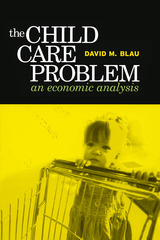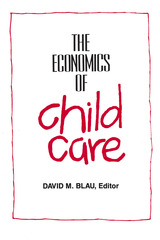2 books about Blau, David M.

Child Care Problem
An Economic Analysis
David M. Blau
Russell Sage Foundation, 2001
The child care system in the United States is widely criticized, yet the underlying structural problems are difficult to pin down. In The Child Care Problem, David M. Blau sets aside the often emotional terms of the debate and applies a rigorous economic analysis to the state of the child care system in this country, arriving at a surprising diagnosis of the root of the problem. Blau approaches child care as a service that is bought and sold in markets, addressing such questions as: What kinds of child care are available? Is good care really hard to find? How do costs affect the services families choose? Why are child care workers underpaid relative to other professions? He finds that the child care market functions much better than is commonly believed. The supply of providers has kept pace with the number of mothers entering the workforce, and costs remain relatively modest. Yet most families place a relatively low value on high-quality child care, and are unwilling to pay more for better care. Blau sees this lack of demand—rather than the market's inadequate supply—as the cause of the nation's child care dilemma. The Child Care Problem also faults government welfare policies—which treat child care subsidies mainly as a means to increase employment of mothers, but set no standards regarding the quality of child care their subsidies can purchase. Blau trains an economic lens on research by child psychologists, evaluating the evidence that the day care environment has a genuine impact on early development. The failure of families and government to place a priority on improving such critical conditions for their children provides a compelling reason to advocate change. The Child Care Problem concludes with a balanced proposal for reform. Blau outlines a systematic effort to provide families of all incomes with the information they need to make more prudent decisions. And he suggests specific revisions to welfare policy, including both an allowance to defray the expenses of families with children, and a child care voucher that is worth more when used for higher quality care. The Child Care Problem provides a straightforward evaluation of the many contradictory claims about the problems with child care, and lays out a reasoned blueprint for reform which will help guide both social scientists and non-academics alike toward improving the quality of child care in this country.
[more]

Economics of Child Care
David M. Blau
Russell Sage Foundation, 1991
"David Blau has chosen seven economists to write chapters that review the emerging economic literature on the supply of child care, parental demand for care, child care cost and quality, and to discuss the implications of these analyses for public policy. The book succeeds in presenting that research in understandable terms to policy makers and serves economists as a useful review of the child care literature....provides an excellent case study of the value of economic analysis of public policy issues." —Arleen Leibowitz, Journal of Economic Literature "There is no doubt this is a timely book....The authors of this volume have succeeded in presenting the economic material in a nontechnical manner that makes this book an excellent introduction to the role of economics in public policy analysis, and specifically child care policy....the most comprehensive introduction currently available." —Cori Rattelman, Industrial and Labor Relations Review
[more]
READERS
Browse our collection.
PUBLISHERS
See BiblioVault's publisher services.
STUDENT SERVICES
Files for college accessibility offices.
UChicago Accessibility Resources
home | accessibility | search | about | contact us
BiblioVault ® 2001 - 2024
The University of Chicago Press









